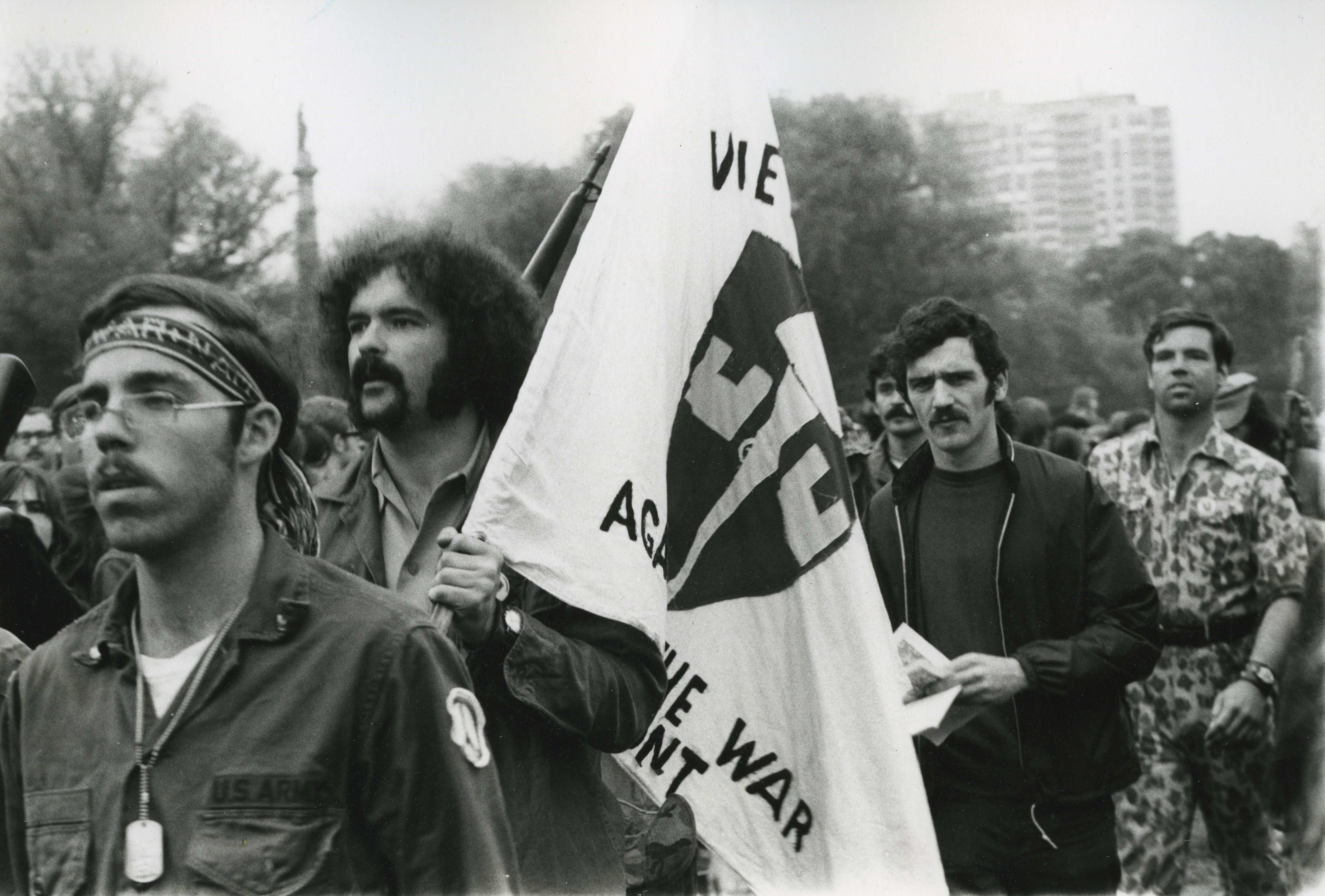Last updated: March 1, 2023
Article
Operation POW

Associated Press
On Sunday evening of Memorial Day weekend, May 30, 1971, more than two hundred Vietnam veterans camped at the Bunker Hill Monument as part of a three day anti-war protest. Organized by the Vietnam Veterans Against the War, this protest began the day before in Concord and Lexington, home to many Revolutionary War era historic sites, and ended on the Boston Common on Memorial Day, following the overnight at Bunker Hill.[1]
Clad in their military fatigues, the veterans intended to retrace Paul Revere’s mythical midnight ride in reverse, from Concord to Boston, sounding the alarm for peace and "hoping to draw parallels between the actions of Revolutionary citizen-soldiers and the present-day marchers."[2] According to historian Elise Lemire:
Like Revere, the antiwar veterans were seeking to bring a message to the people, in their case that the country had shamefully reversed its earlier course and become the type of imperial aggressor the colonists had once fought to vanquish.[3]
The veterans named this weekend-long event "Operation POW," because in their words, "all Americans are prisoners of the war."[4] As they staged their protest at some of the most seminal Revolutionary War sites, they handed out fliers that read:
With an ironic twist...our presence in Indochina as viewed by a native of an occupied village easily coincides with the British army in America.[5]
Authorities arrested hundreds of veterans and their supporters on Saturday night for refusing to vacate the Lexington town green.[6] After a long night and morning of being held, processed, and eventually released, the veterans carried on their planned protest by coming to Boston. They traveled by bus and caravan, however, as their arrest and subsequent delays made marching the whole route impossible given the timeframe.
Despite the expected bad weather, the veterans intended to set up camp and spend the night at the foot of the Bunker Hill Monument. "We slept in the rain in Vietnam," one veteran said, "we can sleep in the rain on Bunker Hill."[7]

Copyright © Diana Mara Henry
The veterans marched on foot to the historic monument not knowing how they would be received by the largely conservative Irish working-class Charlestown community. To the veterans’ surprise and delight, Charlestown residents, many of whom had family serving in the war, opened their windows and cheered them on.[8] According to the Record American:
Some 250 antiwar Vietnam veterans bivouacked in the fog on Bunker Hill...At the height of their demonstration on the historic hill, sympathizers and curious onlookers brought the throng to an estimated 1500 persons...The veterans, dressed in Army fatigues and carrying toy weapons, held a brief rally during which they sang and chanted peace slogans.[9]
In this shared moment, the Charlestown community and protesting veterans united "around the idea that the Vietnam War did not reflect the values for which the colonists gave their lives...nor those of the Bunker Hill Irish-American community whose children were being forced to fight it."[10] Journalist Stu Werbin of the Phoenix wrote that the veteran’s secured their "greatest victory" by bringing out and gaining the support of the "the mothers of Charlestown."[11] On Memorial Day morning, residents brought food and coffee "to fuel the veterans’ final push for Boston" where the protest culminated on Boston Common.[12]
In "Operation POW," the Vietnam Veterans Against the War deliberately and skillfully used the symbolism, ideals, and memory of the American Revolution. In doing so at iconic sites, including Bunker Hill Monument, they effectively raised public awareness and encouraged further support to end the war. As soldiers carrying on the same military tradition as those of the Revolution, they spoke powerfully from personal experience in ways that other anti-war protesters could not. Bestor Cram, a veteran and one of the organizers, reflected years later:
Our role was to give permission to other people to be against the war. We had fought it...We weren’t going to be challenged as to what we were going to say. Our experience gave other people a sense of, 'I can trust this point of view,' and it gave permission to a lot of people to be out front with their own feelings and their own anti-war sentiment.[13]
Footnotes:
[1] For a book length examination of the entire protest, please see Elise Lemire’s Battle Green Vietnam: The 1971 March on Concord, Lexington, and Boston (Philadelphia: University of Pennsylvania Press, 2021)
[2] "200 antiwar veterans march on Bunker Hill," Boston Globe, May 31, 1971, accessed February, 2023.
[3] Elise Lemire, “The Night Vietnam Veterans Stormed Bunker Hill,” History News Network, accessed February, 2023.
[4] "200 antiwar veterans march on Bunker Hill," Boston Globe.
[5] Elise Lemire, "About the Book: Battle Green Vietnam," Battle Green Vietnam: The 1971 March on Concord, Lexington, and Boston, accessed January, 2023.
[6] Alex Ashlock, "50 Years Ago, A Vietnam Protest Led to One of the Largest Mass Arrests in State History," WBUR News, accessed February, 2023.
[7] "200 antiwar veterans march on Bunker Hill," Boston Globe.
[8] Lemire, "The Night Vietnam Veterans Stormed Bunker Hill."
[9] Record American, May 31 1971, page 2, Accessed 1/30/2023
[10] Lemire, "The Night Vietnam Veterans Stormed Bunker Hill."
[11] Stu Werbin, The Phoenix, June 8, 1971, page 5.
[12] Lemire, "The Night Vietnam Veterans Stormed Bunker Hill."
[13] Ashlock, "50 Years Ago, A Vietnam Protest Led to One of the Largest Mass Arrests in State History."
